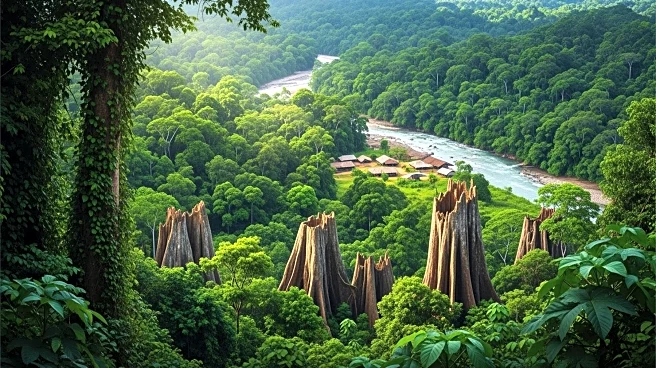What's Happening?
A report by Survival International reveals that at least 196 uncontacted Indigenous groups worldwide face increasing threats from logging, mining, missionaries, and organized crime. These groups, primarily
located in the Amazon rainforest, are at risk of extinction due to external pressures. The report estimates that nearly 65% of these groups are threatened by logging, 40% by mining, and 20% by agribusiness. The issue is compounded by the lack of effective state protection and public awareness. Uncontacted peoples are contemporary societies that avoid outsiders due to historical violence and disease. The report calls for stronger legal protections and a shift in public perception to view these communities as vital to global climate stability.
Why It's Important?
The survival of uncontacted Indigenous peoples is crucial not only for their cultural preservation but also for global environmental health. These communities play a significant role in maintaining biodiversity and stabilizing the climate by preserving large areas of rainforest. The threats they face from extractive industries and illegal activities highlight the need for international cooperation and stronger enforcement of Indigenous rights. Protecting these groups is essential for combating climate change and ensuring the sustainability of vital ecosystems. The report urges governments and corporations to recognize the importance of Indigenous territories and enforce no-contact policies to prevent exploitation.
What's Next?
Advocates are calling for governments to formally recognize and protect Indigenous territories, making them off-limits to extractive industries. Mapping these areas is crucial for safeguarding them from external threats, but must be done cautiously to avoid endangering the groups' health. Corporations are urged to trace their supply chains to ensure commodities are not sourced from Indigenous lands. Public pressure and media coverage are essential in driving policy changes and raising awareness about the plight of uncontacted peoples. The report emphasizes the need for a global no-contact policy and legal recognition of uncontacted territories.
Beyond the Headlines
The report highlights ethical and legal challenges in protecting uncontacted peoples, who are often seen as barriers to development. The rise of organized crime and illegal mining poses significant risks to these communities, requiring international collaboration to address. The cultural significance of uncontacted peoples and their role in preserving traditional knowledge and languages are vital for global heritage. The report calls for a reevaluation of how society views these groups, advocating for their recognition as citizens with rights to self-determination and autonomy.











